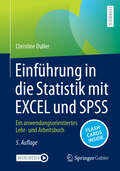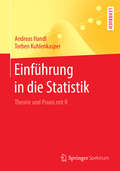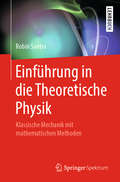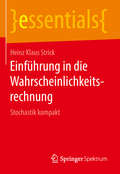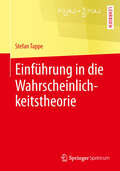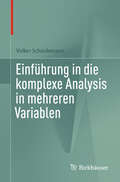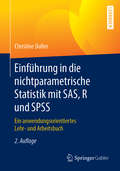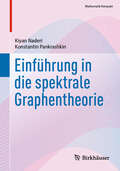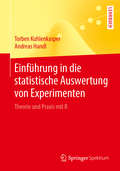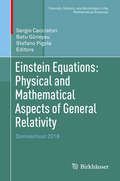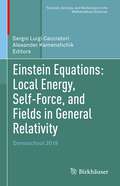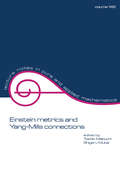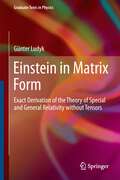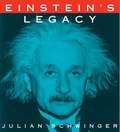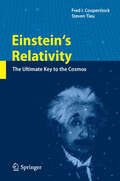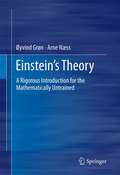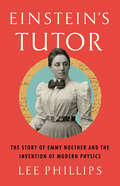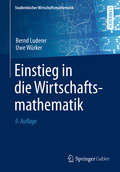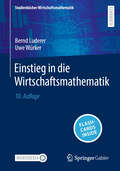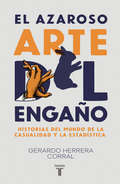- Table View
- List View
Einführung in die Statistik mit EXCEL und SPSS: Ein anwendungsorientiertes Lehr- und Arbeitsbuch
by Christine DullerDieses Lehrbuch führt leicht verständlich und anwendungsorientiert in die beschreibende und schließende Statistik sowie in die Wahrscheinlichkeitsrechnung ein: Die Methoden der Statistik werden nicht nur beschrieben, sondern auch in EXCEL und SPSS umgesetzt. Zahlreiche Beispiele mit Lösungen ergänzen die Darstellung, daher ist das Buch auch für das Selbststudium gut geeignet. Wesentliche Aspekte sind übersichtlich zusammengefasst, um das Lernen zu erleichtern und ein schnelles Nachschlagen zu ermöglichen. Für die 5. Auflage wurden umfangreiche Ergänzungen vorgenommen, alle Software-bezogenen Inhalte an die jeweils aktuellen Versionen angepasst (IBM SPSS Statistics 29, Microsoft EXCEL 2021) sowie insbesondere mehrere Hundert Flashcards ergänzt. Zusätzliche Fragen per App: Laden Sie die Springer-Nature-Flashcards-App kostenlos herunter und nutzen Sie exklusives Zusatzmaterial, um Ihr Wissen zu prüfen.
Einführung in die Statistik: Theorie und Praxis mit R
by Andreas Handl Torben KuhlenkasperDieses Lehrbuch motiviert und erklärt die Inhalte der deskriptiven und induktiven Statistik, indem es die mathematischen Grundlagen der Statistik mit vielfältigen, leicht nachvollziehbaren Anwendungen und Beispielen verbindet: Durch überschaubare Beispiele, die mit Papier und Stift durchgerechnet werden können (und sollten!) gewinnt der Leser zunächst Verständnis und einen routinierten Umgang mit den zentralen Formeln. Für größere Beispiele kommt das frei verfügbare statistische Software R zum Einsatz, welches die Berechnungen schnell und verlässlich auch für große Datensätze umsetzt.
Einführung in die Theoretische Physik: Klassische Mechanik mit mathematischen Methoden
by Robin SantraDieses Lehrbuch bietet Studierenden der ersten Semester eine Einführung in die Theoretische Physik sowie die dazu erforderlichen mathematischen Werkzeuge. Parallel zu den Inhalten der Klassischen Mechanik lernen Sie die nötige Mathematik gleich mit – und auch die Denkweise in der Theoretischen Physik kennen. Unter sorgfältiger Berücksichtigung des Wissensstands von Studienanfängern wird eine ausführliche, schrittweise Darstellung von allen Herleitungen und Beispielen geboten. Dabei werden Ihnen nicht nur die analytischen Lösungsverfahren gezeigt, sondern Sie erhalten auch einen Einblick in die große Bedeutung von computergestützten, numerischen Verfahren. Das Buch beginnt mit den Leitbegriffen des Zustands und der Bewegungsgleichung, worauf aufbauend die Struktur der Newton‘schen Mechanik in leicht nachvollziehbarer Art und Weise vermittelt wird. Als dazugehörige mathematische Themen werden komplexe Zahlen, Vektoren und Matrizen, Taylor-Reihen, gewöhnliche Differentialgleichungen, Fourier-Reihen, partielle Ableitungen und Elemente der Vektoranalysis behandelt. Ebenso finden Sie in diesem Buch eine Untersuchung elementarer Erhaltungssätze als auch deren Anwendung auf physikalische Fragestellungen wie z.B. die Begründung der Kepler‘schen Gesetze.
Einführung in die Theoretische Physik: Klassische Mechanik mit mathematischen Methoden
by Robin SantraDieses Lehrbuch bietet Studierenden der ersten Semester eine Einführung in die Theoretische Physik sowie die dazu erforderlichen mathematischen Werkzeuge. Parallel zu den Inhalten der Klassischen Mechanik lernen Sie die nötige Mathematik gleich mit – und auch die Denkweise in der Theoretischen Physik kennen. Unter sorgfältiger Berücksichtigung des Wissensstands von Studienanfängern wird eine ausführliche, schrittweise Darstellung von allen Herleitungen und Beispielen geboten. Dabei werden Ihnen nicht nur die analytischen Lösungsverfahren gezeigt, sondern Sie erhalten auch einen Einblick in die große Bedeutung von computergestützten, numerischen Verfahren. Das Buch beginnt mit den Leitbegriffen des Zustands und der Bewegungsgleichung, worauf aufbauend die Struktur der Newton‘schen Mechanik in leicht nachvollziehbarer Art und Weise vermittelt wird. Als dazugehörige mathematische Themen werden komplexe Zahlen, Vektoren und Matrizen, Taylor-Reihen, gewöhnliche Differenzialgleichungen, Fourier-Reihen, partielle Ableitungen und Elemente der Vektoranalysis behandelt. Ebenso finden Sie in diesem Buch eine Untersuchung elementarer Erhaltungssätze als auch deren Anwendung auf physikalische Fragestellungen wie z.B. die Begründung der Kepler‘schen Gesetze.
Einführung in die Topologische Datenanalyse
by Andreas Beschorner Rolf BardeliDer Einstieg in die Topologische Datenanalysis (TDA) fällt oft nicht leicht, da sie auf der Algebraischen Topologie beruht, einem Gebiet der reinen Mathematik. Mit dieser Einleitung wollen wir Interessierte (Studierende, Data Scientists, aber auch Mathematiker:innen) an die Hand nehmen, indem wir die primär notwendigen Grundlagen dieses komplexen Bereichs der Mathematik zur Verfügung stellen. Dies geschieht vor allem im Hinblick auf Anwendbarkeit in der Datenanalyse, welcher sich dann die späteren Kapitel des Buches widmen. So hoffen wir, sowohl Informatikern und praktizierenden Data Scientists den eher theoretischen Aspekt, sowie Mathematikern den praktischen, anwendungsorientierten Anteil näher bringen zu können. Dazu werden für wichtige Beispiele Bibliotheken (Python) vorgestellt und Pseudocode oder kleine Jupyter-Notebooks zur Verfügung gestellt. Auch Aspekte der Laufzeit werden, wo relevant, angesprochen. Das alles geschieht im theoretischen Umfeld der Mathematik, so dass die zwei Seiten der TDA, Informatik und Mathematik, ihr Miteinander finden.
Einführung in die Wahrscheinlichkeitsrechnung: Stochastik kompakt (essentials)
by Heinz Klaus StrickIn diesem ersten Teil von Stochastik kompakt erläutert Heinz Klaus Strick die Grundbegriffe, die im Zusammenhang mit den Themen aus Wahrscheinlichkeitsrechnung und Statistik eine Rolle spielen. Mithilfe der Rechenregeln für Wahrscheinlichkeiten können dann einfache Wahrscheinlichkeitsverteilungen einschließlich der zugehörigen Erwartungswerte bestimmt werden. Am Ende steht die Untersuchung der Eigenschaften von Binomialverteilungen. Der Autor Heinz Klaus Strick war 37 Jahre lang als Lehrer für Mathematik und Physik an einem Gymnasium in Leverkusen tätig. Durch seine fachdidaktischen Aufsätze, Schulbücher, Vorträge und Lehraufträge an verschiedenen Universitäten wurde er bekannt. Für seine Aktivitäten und insbesondere für seine Anregungen zum Stochastikunterricht wurde ihm 2002 der Archimedes-Preis der MNU verliehen.
Einführung in die Wahrscheinlichkeitstheorie
by Stefan TappeEine Vorlesung zur Einführung in die Wahrscheinlichkeitstheorie gehört - neben den Standardvorlesungen Analysis und Lineare Algebra - zur Grundausbildung eines jeden Mathematikers. Vielen Studierenden bereitet der Umgang mit dem "Zufall" Schwierigkeiten. Das Ziel des vorliegenden Buches ist, eine leicht lesbare und gründliche Einführung in die Wahrscheinlichkeitstheorie zu bieten; eine Vielzahl von anschaulichen und sorgfältig ausgewählten Beispielen soll den Studierenden helfen, den Zufall in den Griff zu bekommen. Dabei ist dem Autor eine klare und vollständige Darstellung der Theorie ebenso wichtig wie Beispiele und Abbildungen, die schwer aussehende Sachverhalte verdeutlichen. In zahlreichen Abbildungen und in über 100 Beispielen wird die Theorie illustriert und in verständlichen Worten formuliert. Der Inhalt des Buches ist klassisch und deckt eine erste Einführung in die Wahrscheinlichkeitstheorie - der Theorie des Zufalls - ab.
Einführung in die komplexe Analysis in mehreren Variablen
by Volker ScheidemannDieses Buch gibt eine umfassende Einführung in die komplexe Analysis in mehreren Variablen. Während es sich auf eine Reihe von Themen der komplexen Analysis konzentriert, anstatt zu versuchen, so viel Material wie möglich abzudecken, werden Verweise auf andere Teile der Mathematik wie die Funktionalanalysis oder Algebren gemacht, um die Sichtweise und das Verständnis der gewählten Themen zu erweitern. Ein Hauptaugenmerk liegt auf Fortsetzungsphänomenen, die der eindimensionalen Theorie fremd sind und im berühmten Hartog'schen Kugelsatz, dem Satz von Cartan-Thullen und dem Satz von Bochner zum Ausdruck kommen.Das Buch richtet sich in erster Linie an Studenten, die beginnen, auf dem Gebiet der komplexen Analysis in mehreren Variablen zu arbeiten, und an Dozenten, die einen Kurs vorbereiten. Zu diesem Zweck sind zahlreiche Beispiele und unterstützende Übungen im gesamten Text enthalten.Diese zweite Auflage enthält Hinweise und Vorschläge fürdie Lösung der gestellten Aufgaben, mit verschiedenen Graden der Unterstützung.
Einführung in die nichtparametrische Statistik mit SAS, R und SPSS: Ein anwendungsorientiertes Lehr- und Arbeitsbuch
by Christine DullerChristine Duller gibt in diesem Buch eine leicht verständliche Einführung in die nichtparametrische Statistik. Dabei beschreibt sie nicht nur die statistischen Verfahren, sondern setzt diese auch in SAS und R um. Beide Programmiersprachen stellt die Autorin kurz vor, sodass keine Vorkenntnisse notwendig sind. Das Buch eignet sich besonders für Studierende der Wirtschafts- und Sozialwissenschaften und alle Interessierten, die (nur) über Grundkenntnisse der Statistik verfügen, aber auch als Nachschlagewerk für einfache statistische Analysen.
Einführung in die spektrale Graphentheorie (Mathematik Kompakt)
by Kiyan Naderi Konstantin PankrashkinDieses Buch bietet eine Einführung in die wichtigsten Fragestellungen in der spektralen Graphentheorie. In der spektralen Graphentheorie untersucht man verschiedene Eigenschaften von Graphen mit den Methoden der linearen Algebra, insbesondere mittels der Eigenwerte und der Eigenvektoren verschiedener Matrizen, die die Graphenstruktur beschreiben. Diverse Aspekte der Graphentheorie finden eine Anwendung im Rahmen der Data Science. In diesem Buch werden die notwendigen Grundlagen aus der abstrakten Graphentheorie sowie aus dem Gebiet der linearen Algebra parallel behandelt, sodass sich das Buch auch für Studierende der ersten Semester eignet. Das Buch wurde mehrmals in einer Semestervorlesung erprobt und eignet sich daher als Vorlesungsmanuskript und Aufgabensammlung für Lehrende.
Einführung in die statistische Auswertung von Experimenten: Theorie und Praxis mit R
by Andreas Handl Torben KuhlenkasperDieses Lehrbuch stellt eine Vielzahl von Werkzeugen zur Analyse von Experimenten zur Verfügung: Es zeigt die Grundlagen der Auswertung faktorieller Versuchspläne mittels ein- oder mehrfaktorieller Varianzanalysen (ANOVA) sowie mittels gängiger nichtparametrischer Alternativen. Darüber hinaus werden auch Verfahren zur Überprüfung der Annahmen von Varianzanalysen vorgestellt.Die einzelnen Verfahren werden zunächst anhand übersichtlicher Beispiele und Datensätze motiviert, vorgestellt und mit Papier und Stift durchgerechnet. Für größere Beispiele kommt die frei verfügbare statistische Software R zum Einsatz, mit der die manuellen Berechnungen nachvollzogen und schließlich auch größere Datensätze ausgewertet werden können.
Eins, zwei, viele: Eine Kulturgeschichte des Zählens
by Mario H. KrausDieses Werk gibt einen Überblick über die Geschichte des Zählens, sowohl in mathematischen oder philosophischen als auch soziokulturellen Zusammenhängen. Die Frage "Warum und wie zählen wir eigentlich?" wird vielfältig untersucht und beantwortet. Bewusst kurz und unterhaltsam soll das Buch auch Anwendungen zeigen - im Alltag, in der Wissenschaft oder bei Volkszählungen und in der Stadtentwicklung.
Einsatz überwachender Technologien bei Demenz (Gesundheit. Politik - Gesellschaft - Wirtschaft)
by Jasmin LehmannDie zunehmende Technisierung von Alter und Pflege ist nicht nur mit Chancen, sondern auch mit zahlreichen Gefahren verbunden. Selbst vor dem Hintergrund des demografischen Wandels und der damit verbundenen Herausforderungen ist die Integration technischer Innovationen ins Pflegesystem nicht selbstverständlich als erstrebenswert zu erachten. Vielmehr ist der sowohl hierzulande als auch international zur Bewältigung der Herausforderungen eingeschlagene Weg auf seine ethische Legitimation hin zu überprüfen. Ethische Fragen stellen sich insbesondere in Zusammenhang mit dem Einsatz überwachender Technik bei Demenz. Zum einen weisen Betroffene eine erhöhte Vulnerabilität auf, zum anderen kann ihre Entscheidungsfähigkeit in unterschiedlichem Maße beeinträchtigt sein. Mitunter erfolgt elektronische Überwachung bei Demenz auch ohne eine informierte Zustimmung der betroffenen Person. In dieser Arbeit werden auf Basis einer qualitativen Untersuchung zum Einsatz überwachender Technologien bei Demenz ethische, rechtliche und soziale Fragen aufgegriffen und diskutiert. Die Ergebnisse zeigen, dass sich elektronische Überwachung prinzipiell positiv auf die Lebensqualität Betroffener auswirken kann. Dies heißt aber keineswegs, dass es in jedem Fall dazu kommt. Ausschlaggebend sind die Gegebenheiten des Einzelfalls, die es durch fachliche bzw. ethische Standards zu gestalten gilt.
Einstein Equations: Domoschool 2018 (Tutorials, Schools, and Workshops in the Mathematical Sciences)
by Sergio Cacciatori Batu Güneysu Stefano PigolaThis book is based on lectures given at the first edition of the Domoschool, the International Alpine School in Mathematics and Physics, held in Domodossola, Italy, in July 2018. It is divided into two parts. Part I consists of four sets of lecture notes. These are extended versions of lectures given at the Domoschool, written by well-known experts in mathematics and physics related to General Relativity. Part II collects talks by selected participants, focusing on research related to General Relativity.
Einstein Equations: Domoschool 2019 (Tutorials, Schools, and Workshops in the Mathematical Sciences)
by Sergio Luigi Cacciatori Alexander KamenshchikThis volume guides early-career researchers through recent breakthroughs in mathematics and physics as related to general relativity. Chapters are based on courses and lectures given at the July 2019 Domoschool, International Alpine School in Mathematics and Physics, held in Domodossola, Italy, which was titled “Einstein Equations: Physical and Mathematical Aspects of General Relativity”. Structured in two parts, the first features four courses from prominent experts on topics such as local energy in general relativity, geometry and analysis in black hole spacetimes, and antimatter gravity. The second part features a variety of papers based on talks given at the summer school, including topics like:Quantum ergosphereGeneral relativistic Poynting-Robertson effect modellingNumerical relativityLength-contraction in curved spacetimeClassicality from an inhomogeneous universeEinstein Equations: Local Energy, Self-Force, and Fields in General Relativity will be a valuable resource for students and researchers in mathematics and physicists interested in exploring how their disciplines connect to general relativity.
Einstein Metrics and Yang-Mills Connections: Proceedings Of The 27th Taniguchi International Symposium (Lecture Notes In Pure And Applied Mathematics Ser. #145)
by Toshiki Mabuchi; Shigeru MukaiThis volume contains papers presented at the 27th Taniguchi International Symposium, held in Sanda, Japan - focusing on the study of moduli spaces of various geometric objects such as Einstein metrics, conformal structures, and Yang-Mills connections from algebraic and analytic points of view.;Written by over 15 authorities from around the world, Einstein Metrics and Yang-Mills Connections...: discusses current topics in Kaehler geometry, including Kaehler-Einstein metrics, Hermitian-Einstein connections and a new Kaehler version of Kawamata-Viehweg's vanishing theorem; explores algebraic geometric treatments of holomorphic vector bundles on curves and surfaces; addresses nonlinear problems related to Mong-Ampere and Yamabe-type equations as well as nonlinear equations in mathematical physics; and covers interdisciplinary topics such as twistor theory, magnetic monopoles, KP-equations, Einstein and Gibbons-Hawking metrics, and supercommutative algebras of superdifferential operators.;Providing a wide array of original research articles not published elsewhere Einstein Metrics and Yang-Mills Connections is for research mathematicians, including topologists and differential and algebraic geometers, theoretical physicists, and graudate-level students in these disciplines.
Einstein in Matrix Form: Exact Derivation of the Theory of Special and General Relativity without Tensors
by Günter LudykThis book is an introduction to the theories of Special and General Relativity. The target audience are physicists, engineers and applied scientists who are looking for an understandable introduction to the topic - without too much new mathematics. The fundamental equations of Einstein's theory of Special and General Relativity are derived using matrix calculus, without the help of tensors. This feature makes the book special and a valuable tool for scientists and engineers with no experience in the field of tensor calculus. In part I the foundations of Special Relativity are developed, part II describes the structure and principle of General Relativity. Part III explains the Schwarzschild solution of spherical body gravity and examines the "Black Hole" phenomenon. Any necessary mathematical tools are user friendly provided, either directly in the text or in the appendices.
Einstein's Legacy: The Unity of Space and Time
by Julian SchwingerIn this splendidly lucid and profusely illustrated book, a Nobel laureate relates the fascinating story of Einstein, the general and special theories of relativity, and the scientists before and since who influenced relativity's genesis and development. Eschewing technical terms in favor of ordinary language, the book offers a perfect introduction to relativity for readers without specialized knowledge of mathematics and science.The author follows Einstein's own dictum to make explanations "as simple as possible, but not more so." His periodic use of equations as points of clarification involve nothing more than simple algebra; these can be disregarded by math-averse readers. Dr. Schwinger begins with a discussion of the conflict between two principles of electromagnetic theory that are irreconcilable in Newtonian physics, and how Einstein's attempts to resolve this conflict led to the theory of relativity. Readers learn about the meaning of time and the paradoxes of space travel at speeds close to that of light, following the development of Einstein's relativistic thought and his epochal perception that E=mc2. Further chapters examine gravity and its effect on light; non-Euclidean geometry and the curving of space-time; and the impact of radio astronomy and space-age discoveries upon Einstein's model of the universe.Amusing quotes, suppositions, and illustrative fictions -- along with numerous sidebars and boxes explaining physical principles, anomalies, events, and inventions -- enhance this accessible introduction, and provide stimulating food for thought. Preface. 189 black-and-white illustrations. Sources of the Illustrations. Index.
Einstein's Relativity
by Fred I Cooperstock Steven TieuThis richly illustrated book is unique in bringing Einstein's relativity to a higher level for the non-specialist than has ever been attempted before, using nothing more than grade-school algebra. Bondi's approach with spacetime diagrams is simplified and expanded, clarifying the famous asymmetric aging-of-twins paradox. Einstein's theory of gravity, general relativity, is simplified for the reader using spacetime diagrams. The theory is applied to important topics in physics such as gravitational waves, gravitational collapse and black holes, time machines, the relationship to the quantum world, galactic motions and cosmology.
Einstein's Theory
by Øyvind Grøn Arne NæssThis book provides an introduction to the theory of relativity and the mathematics used in its processes. Three elements of the book make it stand apart from previously published books on the theory of relativity. First, the book starts at a lower mathematical level than standard books with tensor calculus of sufficient maturity to make it possible to give detailed calculations of relativistic predictions of practical experiments. Self-contained introductions are given, for example vector calculus, differential calculus and integrations. Second, in-between calculations have been included, making it possible for the non-technical reader to follow step-by-step calculations. Thirdly, the conceptual development is gradual and rigorous in order to provide the inexperienced reader with a philosophically satisfying understanding of the theory. The goal of this book is to provide the reader with a sound conceptual understanding of both the special and general theories of relativity, and gain an insight into how the mathematics of the theory can be utilized to calculate relativistic effects.
Einstein's Tutor: The Story of Emmy Noether and the Invention of Modern Physics
by Lee PhillipsA revelatory story of the woman who made foundational contributions to science and mathematics and persevered in the face of discrimination. Emmy Noether's mathematical genius enabled Einstein to bring his General Theory of Relativity–the basis of our current theory of gravity–to fruition. On a larger scale, what came to be known as &“Noether&’s Theorem&”—called by a Nobel laureate &“the single most profound result in all of physics&”—supplied the basis for the most accurate theory in the history of physics, the Standard Model, which forms our modern theory of matter. Noether&’s life story is equally important and revelatory in understanding the pernicious nature of sexual prejudice in the sciences, revealing the shocking discrimination against one of the true intellectual giants of the twentieth century, a woman effectively excluded from the opportunities given to her male counterparts. Noether&’s personality and optimistic spirit, as Lee Phillips reveals, enabled her unique genius to persevere and arrive at insights that still astonish those who encounter them a century later.
Einstieg in die Wirtschaftsmathematik (Studienbücher Wirtschaftsmathematik)
by Bernd Luderer Uwe WürkerMathematische Methoden sind integraler Bestandteil der verschiedensten wirtschaftswissenschaftlichen Gebiete. Eine sichere Beherrschung der allgemeinen mathematischen Grundlagen sowie der wichtigsten Begriffe und Ideen aus Analysis, Linearer Algebra, Linearer Optimierung und Finanzmathematik sind deshalb für Sozial- und Wirtschaftswissenschaftler unabdingbar. Der Vermittlung dieser Kenntnisse dient das vorliegende Buch, in dem besonderer Wert auf eine verständliche Darlegung sowie zahlreiche Anwendungsbeispiele und Übungsaufgaben mit wirtschaftswissenschaftlichem Bezug gelegt wird.
Einstieg in die Wirtschaftsmathematik (Studienbücher Wirtschaftsmathematik)
by Bernd Luderer Uwe WürkerDieses Lehrbuch vermittelt Studierenden der Wirtschaftswissenschaften die allgemeinen mathematischen Grundlagen sowie die wichtigsten Begriffe und Ideen aus Analysis, Linearer Algebra, Linearer Optimierung und Finanzmathematik.Es legt besonderen Wert auf eine verständliche Darlegung und bietet ausführlich diskutierte Beispiele, Aufgaben und Lösungen zu allgemeinen mathematischen Grundlagen sowie zahlreiche Anwendungsbeispiele und Übungsaufgaben mit wirtschaftswissenschaftlichem Bezug. Darüber hinaus wird die Darstellung ergänzt durch wichtige Formeln, Übersichten und Hinweise.Für die vorliegende 10. Auflage wurden 180 digitale Flashcards ergänzt, mit denen der eigene Lernerfolg in der zugehörigen App oder im Browser überprüft werden kann. Im Buch selbst wurden kleine Korrekturen und Aktualisierungen vorgenommen.Eine große Auswahl an Übungsaufgaben zu den hier behandelten Inhalten sowie weitere Flashcards finden sich im passenden Arbeits- und Übungsbuch Wirtschaftsmathematik (Luderer/Würker/Kalkschmid-Paape). Lehr- und Arbeitsbuch sind inhaltlich aufeinander abgestimmt, können aber auch ganz unabhängig voneinander verwendet werden.
El ascensor mágico: Elevator Magic (Spanish Edition) (MathStart 2)
by Stuart J. Murphy“Kids, young and old, fall in love with math when they see how real-life and effortless it becomes thanks to these books.” —Kimberly D. Mueller, Ed.D., First Grade Teacher, Ashbrook School, Lumberton NJThis high-quality Spanish-language book can be enjoyed by fluent Spanish speakers as well as those learning the language, whether at home or in a classroom.Pasea junto a Ben mientras resta pisos para llegar a la planta baja. ¡Verás que encuentra maravillas donde quiera que va!Math skills are life skills, and the MathStart series supports success!This award-winning series by Stuart J. Murphy teaches math through stories and visual models63 books divided into three levels with 21 books in eachFun activities kids will love are included to help parents and teachers emphasize the lessonsEngaging and relatable stories, with each story revolving around practical applications of the math concept presentedLively art from top-notch illustratorsCharts and other visual representations help children understand how the math works and promote deeper comprehensionMathStart's unique combination of stories, illustrations, and visual models helps teachers and parents in the teaching of math and provides all children with the opportunity to succeed.The math concepts taught in MathStart books conform to state and national standards. Level 1 is Pre-K–Kindergarten; Level 2 is Grades 1–3; Level 3 is Grades 2–4. The series follows math topics across grades so there is a foundational path to learning that runs through the levels.Help kids with their math skills plus their reading skills with the engaging and fun MathStart series!
El azaroso arte del engaño: Historias del mundo de la casualidad y la estadística
by Gerardo Herrera CorralEl azar, el error y el engaño están presentes en todos los ámbitos de nuestras vidas: el trabajo, las relaciones personales, la política, la economía. /strong> El error, incluso, es parte esencial del material biológico que nos forma. Los seres vivos llegamos a ser lo que somos por el cambio continuo de la estructura genómica: el código grabado en nuestros genes se equivocó una y otra vez para que, alfin, una de las múltiples configuraciones acabara prevaleciendo. En otras palabras, los seres humanos somos producto del azar y el error. ¿Pero dónde está la frontera entre azar y error? Y más aún: ¿cuál es la diferencia entre error y engaño? Los errores pueden ser una fuente inmejorable de aprendizaje , si sabemos detectarlos. Por otro lado, se puede engañar sin mentir abiertamente, es decir, sin dar información falsa. Esto ocurre con frecuencia, por ejemplo, en la estadística, cuando se oculta información, se dan datos parciales o se ofrecen interpretaciones sesgadas. Por ello, nos dice Gerardo Herrera Corral, el conocimiento estadístico debería formar parte de la educación básica de toda persona. Sí, la estadística puede utilizarse para analizar la realidad, para explicar y comunicar mejor datos complejos, pero también puede emplearse para deformar los hechos, manipular y engañar al público. Este libro reúne historias en las que la estadística es la clave: ¿Es real el cambio climático? ¿Viven más tiempo los fumadores? ¿Hay vida en otros planetas? ¿Se acerca el fin de la cultura del automóvil? Al analizar estos casos, el autor nos ayudará a definir conmayor claridad las barreras entre verdad y mentira, azar y error.
